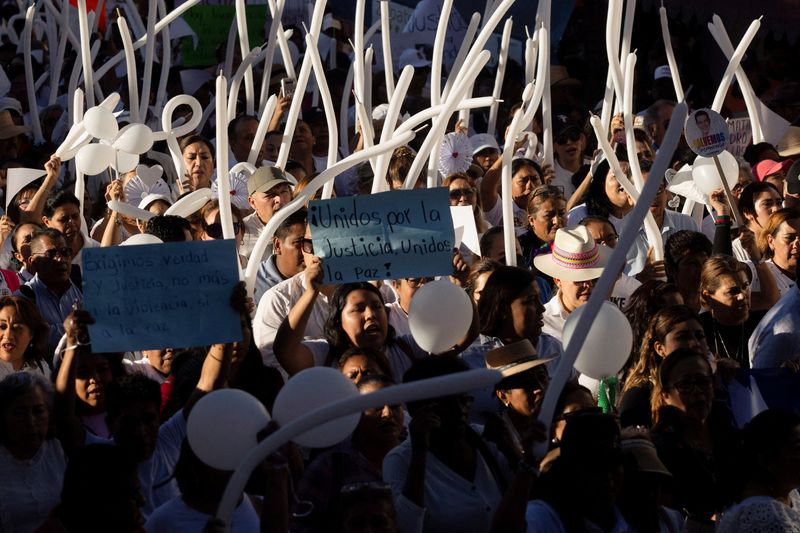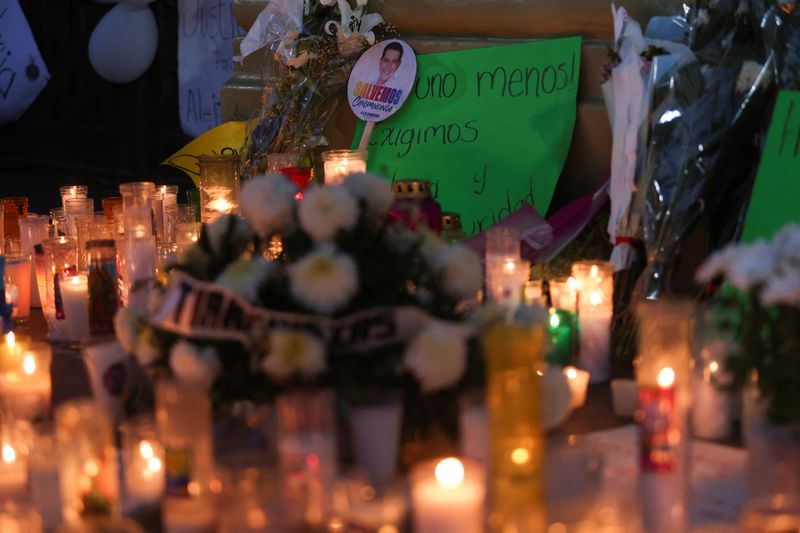By Cassandra Garrison
CHILPANCINGO, Mexico (Reuters) - Hundreds of people dressed in white marched through the streets, many with tears in their eyes, chanting "No More Violence!" on a humid October afternoon in Chilpancingo days after the brutal murder of its mayor.
The brazen decapitation of 43-year-old Alejandro Arcos, which has yet to be solved, has sparked anger and resignation. Many doubt whether Mexico's newly inaugurated President Claudia Sheinbaum will be able to prosecute the murder or tackle the epidemic of cartel-led violence which has wracked Mexico for over a decade.
"We really don't want 'hugs not bullets,'" said Doreli Vega, 30, referring to the mantra of Sheinbaum's mentor Andrés Manuel López Obrador who aimed to avoid clashes with cartels and instead address the root causes of violence through social programs.
"We're tired of that," said the mother of a year-old baby, weeping as she described living in terror and uncertainty.
Vega said an increased presence of the militarized National Guard police force, which López Obrador made his main law enforcement organ, had failed to improve the situation in Chilpancingo, the capital of Guerrero state - one of the poorest in Mexico.
"They feel they have the power to do whatever they want, and we really haven't seen the change that they promised for the security of our people," Vega said. "Everything got worse."
On Tuesday, another local mayor, Roman Ruiz Bohorquez in the community of Candelaria Loxicha in Oaxaca state, was stabbed to death at his home.
Arcos and Ruiz Bohorquez are among the 1,247 homicide victims in the first two weeks of Sheinbaum's administration, pollster TResearch's analysis of government data showed, as Mexico's staggering murder rate continues into the new administration.
The attention around Arcos' murder, shocking even for notoriously dangerous Chilpancingo, is a crucial test for whether Mexico's first female president can break the cartels' stranglehold. She is pairing López Obrador's more social approach with improved intelligence sharing and coordination among government organizations and a beefed-up National Guard.
"It's a shot across the bow of organized crime writ large that they're not scared," said Mike Ballard, director of intelligence at international security firm Global Guardian, who referred to Arcos' killing as "almost an act of terror."
Arcos had left Chilpancingo in his pickup truck without a driver or security escort, heading toward the nearby town of Petaquillas, Mexico's security minister said. Local media have reported that Arcos had met with members of Los Ardillos, a criminal group active in Guerrero, though Reuters could not independently verify that meeting.
Violence is erupting in other areas of Mexico as well.
In Sinaloa's capital Culiacan, an ongoing conflict between the Sinaloa Cartel's two most powerful factions has killed more than 230 people. The violence was prompted by the July arrest of legendary Sinaloa trafficker and cartel leader Ismael "El Mayo" Zambada in the United States.
On the day of Sheinbaum's inauguration, soldiers killed six migrants and injured 10 more in southern Chiapas state near the border with Guatemala after they fired on a pick-up truck. The defense ministry said they mistook the vehicle for one used by organized crime and that the two soldiers responsible have been detained.
"She doesn't have many good options to try and combat this, but I think (the murder of Arcos) is definitely a wakeup call that something has got to change," Ballard said.
DYING HOPE
Sheinbaum is walking a tightrope on security, making subtle shifts while maintaining her mentor's strategy.
She has said she plans to keep the National Guard while targeting the social causes of violence, and improve investigative capacity in a country where only about 1% of all crimes are resolved according to Human Rights Watch.
Critics argue that López Obrador's more passive approach allowed the cartels to strengthen and expand.
Almost 200,000 people were homicide victims during López Obrador's six-year term - an average of one every 15 minutes and the highest rate under any president in modern Mexico, TResearch analysis showed.
Guerrero is on a list of deadly states where Sheinbaum said she would focus resources.
But on the streets of Chilpancingo, mostly deserted by 8 p.m. as residents fear venturing out after dark, many said they had lost hope she would improve the situation.
Guerrero has historically been a hot zone for murders and shootouts by rival crime factions battling for control, often leaving their victims' decapitated bodies in public places.
The constant threat of violence has taken its toll on the local economy, said Ivan Salgado Ramirez, president of the town's business chamber.
"The idea of an entrepreneur is to grow or reinvest, and at this moment we do not have the confidence to do so and ... there is simply no development at the local business level."
Salgado said he was encouraged by Sheinbaum's focus on Guerrero but only time would tell whether it generates the necessary peace.
Guerrero has remained a bastion of support for López Obrador and Sheinbaum's Morena party, buoyed by generous social spending. Now, some people said they have had enough.
"What future awaits my grandchildren and my great grandchildren?" asked Maria Victoria Ramirez, 68, as she marched at the front of the crowd with her relatives and neighbors.
"She (Sheinbaum) hasn't come here to Chilpancingo. ... She doesn't want to realize that it is a very dangerous city here."
As last week's march to honor Arcos reached the town's main plaza, it had grown to some thousand people. The bells of the local cathedral rang as mass began to honor the slain mayor. An older couple who had spent their lives in the city held hands.

Asked whether they thought Sheinbaum would make life safer for them, the woman shook her head.
"Unfortunately not. We can only trust in God," she said.
